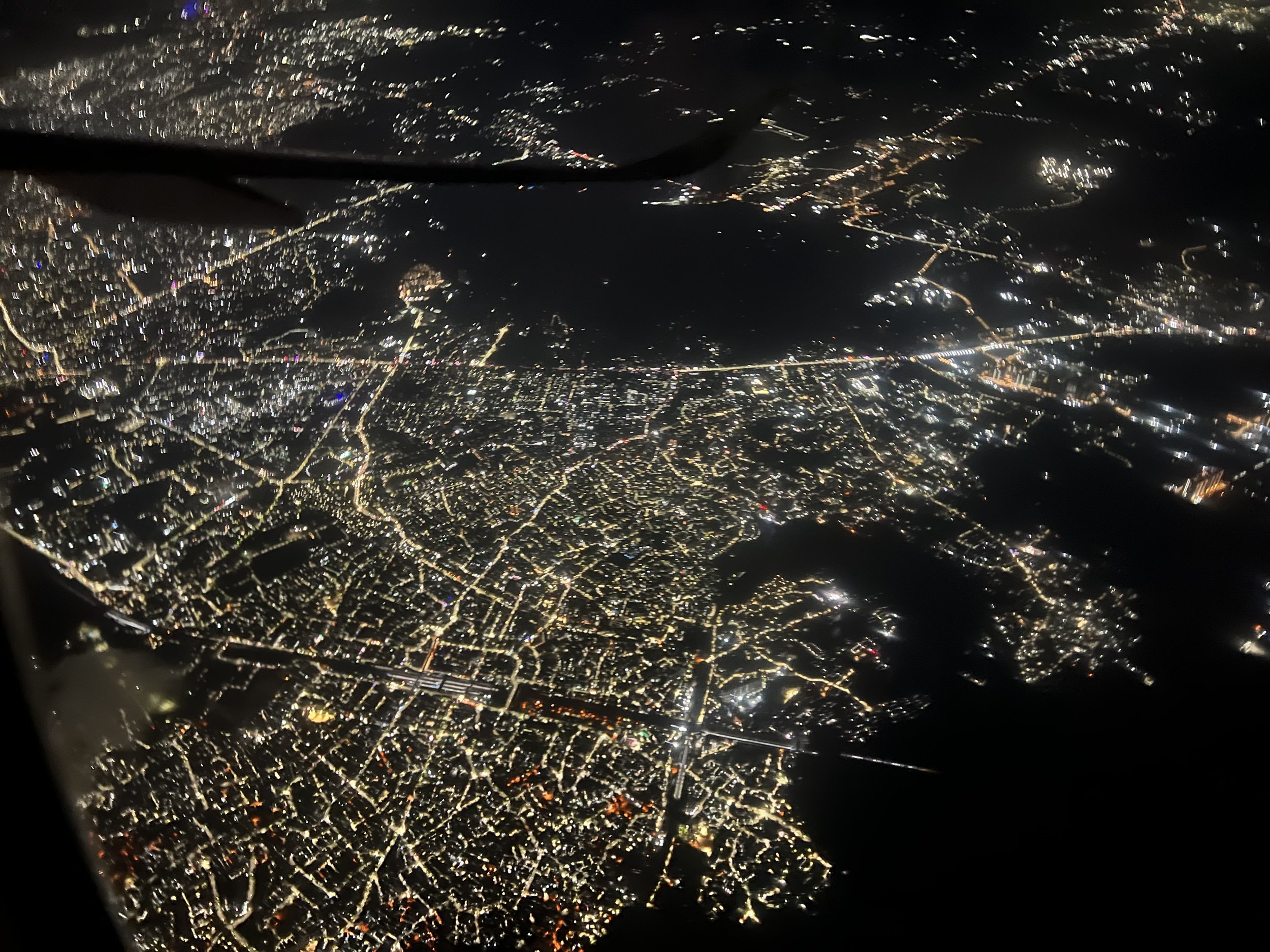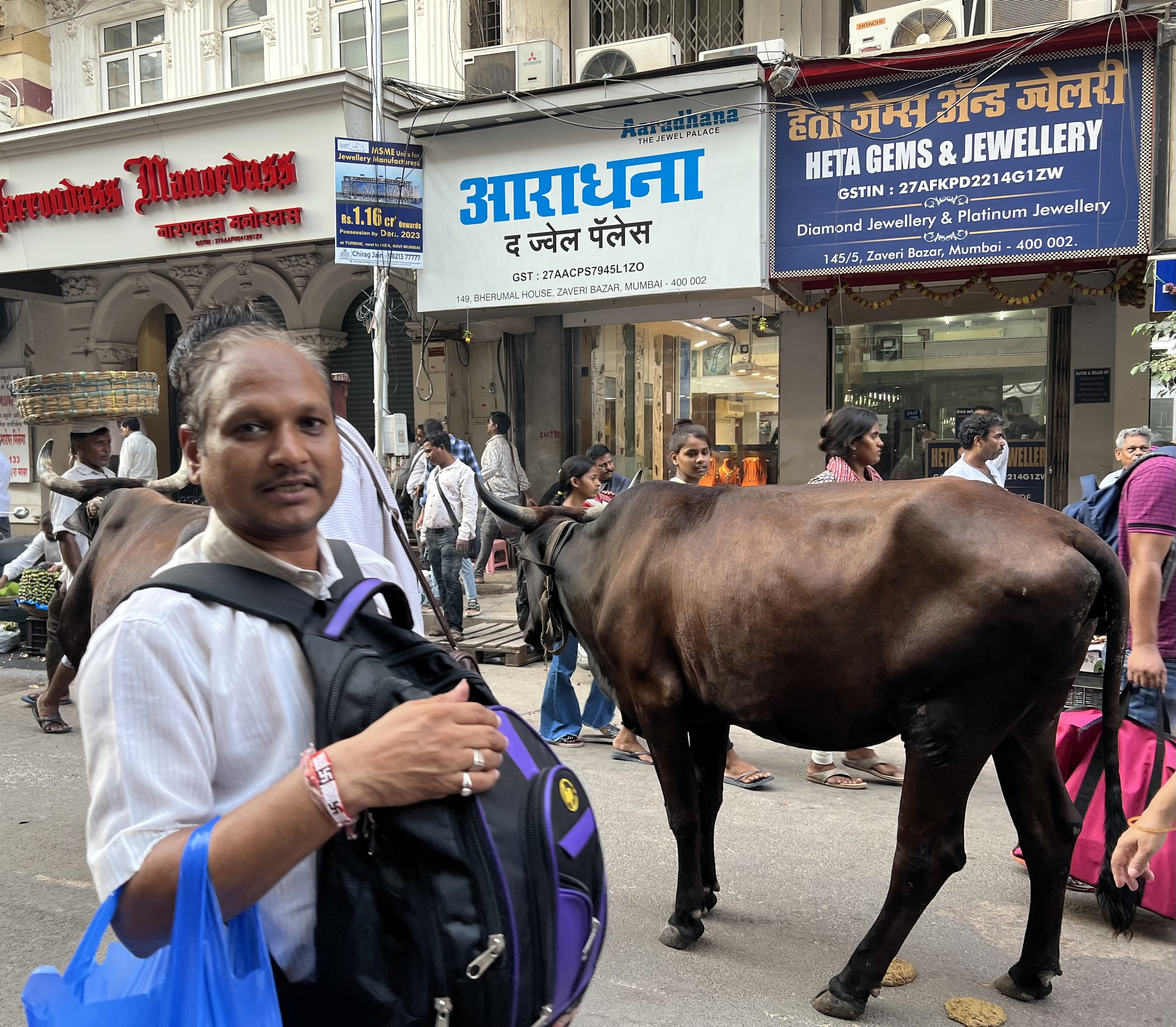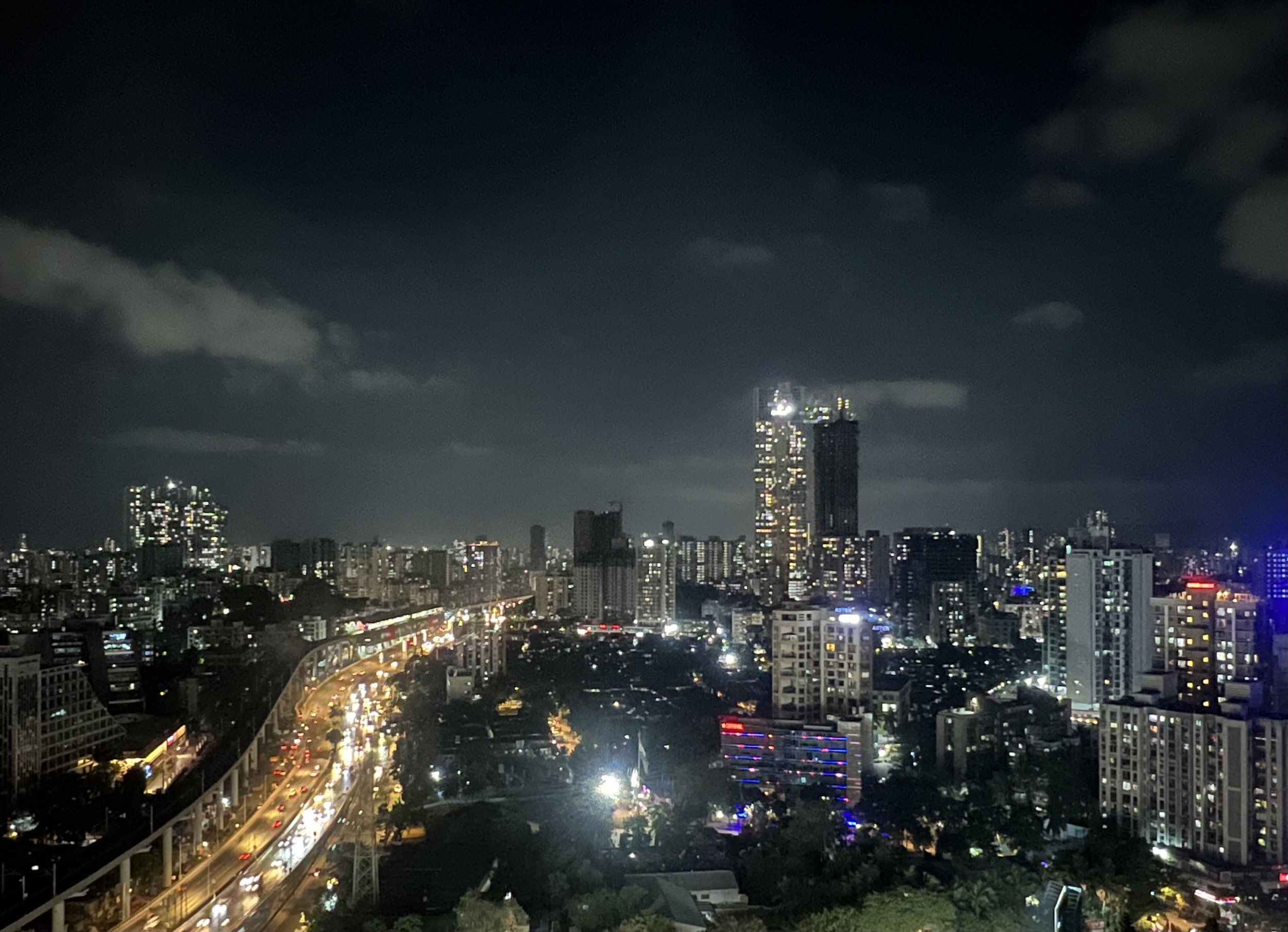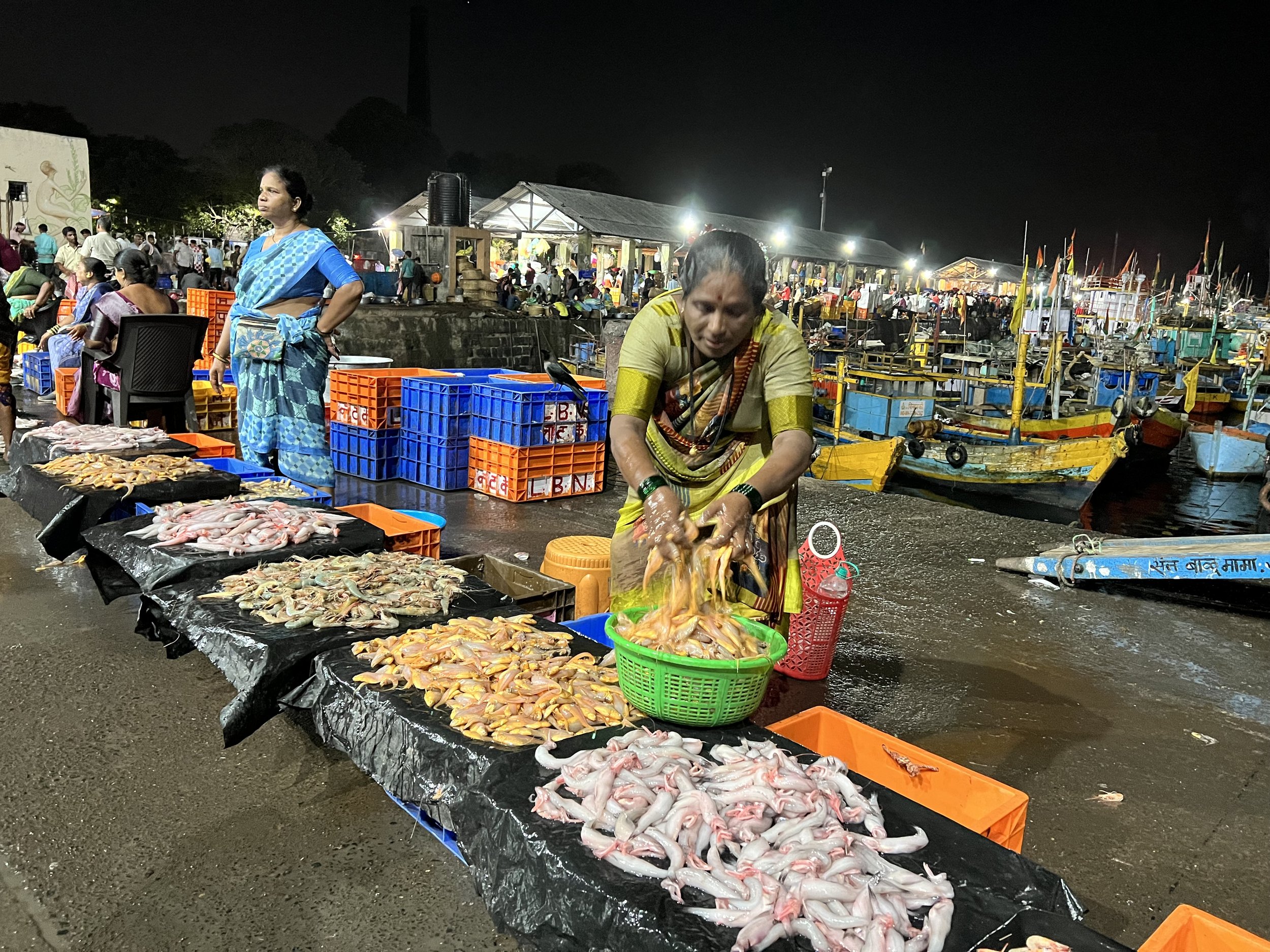Mumbai, 1 AM, coming in for a landing
MUMBAI, INDIA, May 2023, David & Susan Greenberg
Mumbai is looking down from a spiff hotel to the shantytowns below. It’s eating lamb soup in a restaurant and seeing a man in a barbershop across the street having his armpits shaved with a straight razor. It’s women crouched in the street placing fresh wheat kernels on a cloth and flinging them in the air repeatedly (as in ancient days) to separate the chaff. It’s a goat curled up on a parked motor-scooter seat. It’s folks with English as a second language who speak it dauntingly well. It’s soupy heat. It’s calculating whether or not the one-in-a-million chance of contracting Japanese Encephalitis is worth the $1100 vaccination. It’s a nod of shared humanity from a man in a market. India is unpasteurized and we gobbled up all we could.
Day 1--The Crawford Market. British built, centuries old -- it contains all of everything. A professional earwax extractor in an orange hat, badge of his trade, searched for customers. A man sold water from a large ceramic crock. Another sold glasses of buttermilk. There was a berobed bald man with a long orange beard (dyed with henna). None consented to photos. Wild cows sauntered down the street, unleashed, unguided.
People touched them and prayed. Cows are sacred, eating them a crime. There were shops selling ostentatious gold jewelry. There were shops to test your gold jewelry’s purity. There were men, crouched on the ground, selling betel leaf, a narcotic, illegal in the United States. The fresh leaves were arranged artfully on a tray with various spices which customers chose like ice-cream toppings. The leaves were rolled into sushi-like cones, spices spooned in, and customers chewed them.
There were stalls filled exclusively with potatoes or garlic or okra (which they call lady fingers). The proprietors sat regally amidst their produce.
The King of Garlic
Same for fabric shops. There were more mangos on display than stars in the sky.
Flower blossoms or just their detached petals (for ceremonial purposes) were ubiquitous, saturating everything with color and scent.
There were men you could hire to carry your groceries in enormous baskets balanced on their heads.
There were mosques broadcasting their imam’s calls to prayer and Hindu temples filled with burning incense and idols such as the Monkey god or Ganesh the Elephant-Headed god. Another Hindu god is a stone spewed from a volcano – small or enormous – painted orange that looks like Jabba the Hutt.
Market restrooms were appallingly rank.
Near the exit, The God Who Loves Cigarette Butts (TGWLCB) smoked furiously through holes comprising his mouth in a face that looked like a metal mask jammed in the dirt. His high priest clanged a bell furiously while people chanted around him. TGWLCB is a Hindu god who sprang up almost spontaneously as Hindu gods are wont to do. Another such spontaneous spirit is the Covid God, though you did not see his shrine. It’s a constantly updated cast.
Day 2--Wake Up Mumbai. Our guide gathered us at 4 AM. Stepping from the air-conditioned hotel lobby, we expected cool morning air. Instead, though it was dark, heat bludgeoned us. The roads were relatively quiet and drivers stayed in three marked lanes rather than the nine or ten snarled paths into which they later morphed.
The open-air fish market is where sustenance is pulled from the Arabian Sea by men and sold by women seven days a week. Tubular squid, silver bream, and green crustaceans in multicolored plastic baskets awaited throngs of pre-dawn buyers.
Busy merchants pushed battered wooden carts through the melee warning others to move or deal with the consequences. A woman balanced an enormous skate -- bigger than the basket – on her head, the skate’s vertices and whiskers hanging over and dripping with each step. This piscine choreography feeds a city of 21 million. Yet the gargantuan market disappears before first light as the fish are transported by cart, basket, tuk-tuk and train into the city’s intricate crannies. Fishmongers, leaving the market flush with rupees, frequented a line of pop-up shops selling ceremonial marigolds, produce, and household goods.
There are close to 400 languages spoken in India, but four languages: Marathi, Hindi, English, and Gujarati dominate in Mumbai. Delivering newspapers in the language apropos to various readers, then, is a multilingual puzzle. Different households require specific sets of newspapers depending on who speaks what. Before dawn, men crouch and sort daily papers--Gujarati and Hindi in this stack, Marathi, Hindi, and English in another, and so on.
Lots of people equals lots of laundry. Good thing the world’s largest open air laundry operation, Dhobi Ghat, is located in southern Mumbai. Well over a century old, laundry is washed, bleached, and scrubbed in large concrete basins, slapped silly against adjoining rocks, rinsed, and hung to dry on ropes twisted tight, so the corners of fabric can be tucked in and held in place without clothes pins. The linens are pressed, folded, and delivered to hospitals, hotels, and neighborhoods all over the city. A hive of activity 20 hours a day, residents live where they work. How they keep track of what goes where passes understanding.
Days 3 & 4--Food Extravaganza. A Tandoor is a cylindrical oven, open on top, sunk inside a counter into which ingredients are lowered. Sometimes, as with bread dough, they’re slapped onto its walls to bake. In India they’re typically coal fed and reach 900 degrees. We had a romantic meal at a high-floor hotel restaurant with tandoori chicken and lamb to rival American bbq.
Along with this we had naan, a tandooried chewy-stretchy flatbread filled with molten cheese, fetchingly blistered, pizza’s handsome second cousin. Dessert was milk dumplings, good but not quite as delicious as they looked.
At the more modest restaurant across the hall, we had onion chutney, tomato chutney, mint chutney, cilantro chutney, and fresh coconut chutney, all iridescent in flavor. We spooned them onto everything.
We ate street food in a Muslim district: Fresh-squeezed papaya juice with crushed watermelon.
Ground buffalo meat (called buff) cylindered around a heavy skewer, charred over hellish charcoal.
It was plated with deep-fried flatbread, thinly sliced purple onion, a large bouquet of fresh mint, fresh lemon to squeeze over, and cilantro chutney. We pulled off pieces of bread and scooped up the other ingredients. The food was a clapper and we were bells ringing with joy. It cost roughly one dollar, fifty times less than our fancy hotel chow. And it was better. We ate basmati rice and buff scooped from a pot as big as a bathtub.
A man piped batter from a bag with a hole in the bottom into a cauldron of hot oil to create squiggly pastries. He scooped them with a perforated spoon into rose-scented sugar syrup and thence to customers. This was so good.
Another shop sold hand-churned ice-creams, including fresh pink guava with a light sprinkle of chile powder and salt. This was life-altering.
There were wagons pulled by oxen. A pet goat (at least we think it was a pet and we think it was a goat). A fellow on a horse with a red blanket saddle. There were beggars all about, many of them children. There were women in burqas. There were men dressed in elegant religious garb, mainly robes, with skullcaps. Most had Gandalfian beards. It was not uncommon to see men holding hands with men, women with women.
It took over an hour to snag an Uber back home. Apparently, we were in such an obscure location, it was almost beyond the powers of GPS to find us. Even at 11 PM, and our hotel only a few miles off, traffic was so thick that it took one-and-a-half hours to return. Along the way we saw families sleeping on the street, a heartbreaking juxtaposition to the families we saw in chauffeured cars the next day. Much of the traffic was what they call rickshaws or tuk-tuks, small, three-wheeled, open-air vehicles with handlebars instead of steering wheels. Small scooters were everywhere, sometimes balancing three or even four people. Some women rode sidesaddle behind the driver. We saw one woman sitting sidesaddle on a scooter that was jinking through traffic, tranquilly reading a book.
We drank no small number of medicinal gin and tonics which successfully warded off Japanese Encephalitis. We brushed our teeth with bottled water. We took at least two showers a day. We raptly watched Indian soap-operas, crackling with romance, though we couldn’t understand a word. We mainly slept the 25 hours home. Arriving parboiled, we savored the cool air of our native heath.














